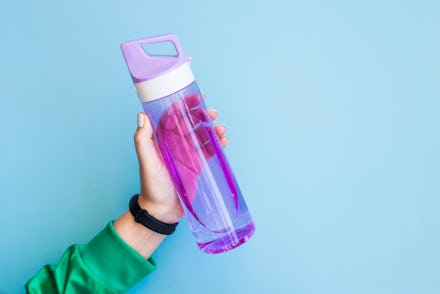The illusion of the perfectly hydrated human

Being hydrated is an undeniable status symbol and a rather deceptive indicator of having your life together. While humans do need water to stay healthy, we don’t actually need as much as you might think. Is our obsession with hydration actually about health, or is it just another form of conspicuous consumption? A revelatory piece in the New York Times — as well as my own observations of hydration culture — has me convinced that our extravagant over hydration is about more than our health — its about our identity.
Drinking eight plus cups a day is thought, popularly, to give you clear skin, stave off hunger pangs (Goop-speak for staying hot and skinny). For the record, the actual rule of thumb when it comes to water consumption is pure common sense: Drink when you’re thirsty, make sure your pee isn’t too yellow, and supplement your water with moisture-rich foods. But who needs science when you have the beauty and wellness marketplace to tell you what you need?
Since hydration became haute couture, we needed something to camel all our water around in. Water bottles themselves became fashionable (ish) in the early aughts with hippie hiker types and their adorned Nalgene bottles. Back then, carrying a water bottle equated to making a statement. It was supposed to say, “I care about the environment and my health,” but it often came off more like, “I have so much personality! See all my stickers?” Now, fancy water bottles are a mandatory staple of the athleisure uniform and can run over $40. The good news is that, according to fashion forecasters, the Nalgene is making a comeback and they’re still a fairly painless $11.
Real talk, I own no less than five S’well bottles. I regularly say things like, “hydration equals happiness,” and I have always attributed my clear skin to being hydrated, so I am definitely on this bandwagon. But I might be doing entirely too much. “It’s a popular idea among patients and a popular idea in consumer media that hydration equals healthy skin,” Joshua Zeigler, a dermatologist at Mount Sinai in New York City told the New York Times. “It’s a complete myth that eight glasses of water are necessary to maintain hydrated skin.”
He also said that “most recommendations for hydration come from studies of athletes, who lose fluid rapidly during workouts or competitions, and are at a much higher risk for dehydration than the average person.”
But what about the research that says that hydration is linked to better cognitive performance? It’s true, that research exists, but what that research actually says is that elderly folks might perform better on cognitive tasks when they aren’t dehydrated, not that everyone is smarter when they drink water. And let’s be real, the impulse to constantly strive for intellectual perfection is borne of privilege.
Bottled water became the best-selling beverage in the US in 2017. According to the Times, the fancy water trend actually started way back in the ‘70s with brands like Evian and Perrier, who slapped labels and hefty price tags on what should be, in most first world locales (except Michigan) a cheap and readily available natural resource.
Since water became branded, we have seen unpredictable iterations of a relatively simple compound. Electrolyte water, energy water, hydrogen water, water with bubbles. What is carrying around all these fancy waters and bottles to keep us extra hydrated actually doing for us? It keeps us spending and maintains the illusion that we are functioning, responsible adults who will age slower because our insides are doused with LaCroix.
I'm all for keeping the wrinkles away, but linking water with pleasure — and not perfection — might be a healthier way to imbibe.